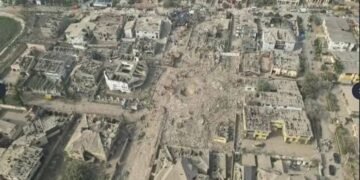Last month, precisely November 7, the Punch Newspapers accounted that no fewer than 16 persons were kidnapped along the Akure-Owo Expressway, in Uso town in Owo Local Government Area. It was reported that among the victims kidnapped was the Iyaloja of Isua Akoko In Akoko South East Local Government Area Of Ondo State, Chief Mrs Helen Edward and some other market women. It was also gathered that the victims were coming from the monthly meeting of women market leaders in Akure when they were abducted. Pathetic enough, a source said the driver of the bus which conveyed the victims was immediately released by the abductors who asked him to go home and inform the families of the victims. The official development after that I don’t know? Definitely a ransom was involved.
Similarly, on December 2, Premium Times reported that a chinese engineer kidnapped in Ekiti State was freed, allegedly after the payment of ransom. His freedom was confirmed on the day a team of security personnel in neighbouring Ondo State arrested suspects allegedly involved in the murder of Israel Adeusi, the traditional ruler of Ifon in Ose Local Government Area of Ondo State. And again, VOA sometimes reported a case of a Thirty-two-year-old Olumide Peter, who was returning from an evening class at the International Institute of Journalism in Abuja when several men hijacked his car and took him away. The kidnappers reportedly held Olumide for days and tortured him until an unknown amount of money was paid to secure his freedom.
Today, it oppresses and depresses my heart as kidnapping for ransom is one of the biggest orchestrated crime in Nigeria, which is seen as a national security conundrum. Seemingly, most of these kidnappings are often violent and resistance always result in the death of victims. Thousands of Nigerians have fallen victim of the crime and have had to pay millions of demanding naira in ransom for their freedom. Piteously, kidnapping is seen as a money-spinning and remunerative business in a swiftest means to wealth by those involved in this racketeering. Yet, the current wave of abductions across the country makes every person a potential target regardless of social class or economic status unlike political kidnapping which started in the Nigeria’s oil rich Niger Delta region in the early 2000s and the one by terror group, Boko Haram in the Nigeria’s northeast and northwest that began in 2009 when the conflict there started.
Maybe you have also read a conventional report released by SB Morgen (SBM) showed that Nigeria has paid at least $18.34 million (N7 billion) as ransom to kidnappers between 2011 and 2020, bringing to light the challenges of insecurity and unemployment in Nigeria. In the report titled Nigeria’s Kidnap Problem: The Economics of the Kidnap Industry in Nigeria, contained the breakdown of the victims names, date, state and amount paid respectively. The report also showed four of the top 10 states with a high number of kidnap incidents over the last decade are in the oil rich zone and northern region of the country.
Again, based on the report, up until late 2018, kidnap attempts were targeted at specific victims who were mostly politically-exposed persons, business owners and their close relatives, or expatriates. With each passing year, Nigeria proves to be less safe than the last. Kidnapping has increased in almost all states, but there is a massive rise in Kaduna, Rivers, Katsina, Zamfara and Taraba, and the South-western states, while only Bayelsa saw a fall in the number of incidents compared to the period of 2011 to 2015.
Specifically and regrettably, I wasn’t so always concerned for the rich, as in the past, kidnapping victims tended to be the wealthy and the prominent, and so kidnappers had every interest in keeping their victims alive to extract the maximum ransom possible. But with a new report from SB Morgen and what I hear on a daily basis, a Nigerian consulting firm, using data gathered from a variety of open sources, including the Council’s Nigeria Security Tracker, showed that, over time, the pool of potential victims has greatly expanded. Now, victims are often poor villagers, sometimes kidnapped indiscriminately, a departure from the targeted kidnapping of wealthy people. They struggle to pay ransoms quickly because of their relative poverty, and victims are much more likely to be killed. The report also presents a valuable attempt to quantify the costs of kidnapping and to map its spread.
Pathetically, In many parts of the country, kidnapping appears to have become horse-trading, especially for otherwise unemployed youth. Little did I know why SB Morgen once expressed concern that kidnapping will increase as Nigeria falls into recession driven by the coronavirus and the fall in oil prices, putting more people out of work. Now we are into recession, which is projected to end next year first quarter. Thus, there is no gainsaying if we should expect more of kidnappings in the coming months. Do you know what I should talk about?
Right now, one might want to push me into the discussions of the causes of kidnappings especially the incessant cases in the past days. However, I don’t want to rant about the causes of kidnappings or the reasons for the rise in kidnappings. We all know them. I don’t want to talk about the everyday report that reveals the rising levels of youth unemployment is a major factor responsible for the growth of kidnap cases. I don’t want to talk about the country’s unemployment rate that keeps rising everyday from 18.8 to 23.1, from 23.1 to 25.7 from 25.7 to bigger binaries every quarter. I don’t want to talk about the many cases of political leaders and aspirants, as they take advantage of this unemployment crisis.
No wonder why the previous SBM research has shown that the crime rate soars during election periods and politicians key into the mass idleness of young people by using them for political violence. Nigeria has a problem of large swathes of ungoverned spaces, areas of the country that are without government or security presence. This puts residents at the mercy of whichever criminal elements are in the ascendancy. I don’t want to talk about them.
Again, I don’t want to talk about poverty, I don’t want to talk about the many people who lives below $1 a day, which means living below the poverty line. I don’t want to talk about how poverty can propel people toward crime as a way to make ends meet. I don’t want to talk that sometimes, a person who is poor might believe that kidnapping or other illegal acts could provide the necessary money to start a new life, a life that will no longer involve crime. I still don’t want to talk.
Moreso, I also don’t want to talk about Illiteracy, that it is the inability to read or write. I don’t want to talk about how literacy and education can also be an important foundation upon which to build a deeper understanding of moral judgment and decision making. I don’t want to talk about the daily kidnappings and bombings perpetrated by Boko Haram, the militant Islamic group in Nigeria, are caused by illiteracy, at least in part. I don’t want to talk about brainwashing, a child to illiteracy, how leaders of a good-for-nothing group will feed their group with false ideas which they cannot disprove by reading outside sources. I don’t want to talk about religion, I don’t want to talk about the wrong ideas.
Withal, I don’t want to talk about greed, how how youths could be hungry about vanity desires. I don’t want to talk about how people are not contented with what they have and wish they could buy more and more things, whether it’s fancy clothes, cars, houses, or jewelry. I don’t want to talk about the negative impact of greed and how greed may turn to outlawry to make more money. I don’t want to talk about how a friend will kidnap a friend for money, how brother will kidnap brother, how businessman will kidnap his business rival for a large ransom to become richer. I don’t want to talk about it.
For the records we all know it. We know that irrespective of the type of kidnapping and the motive for its perpetration, the psychological and financial impact of the problem can be very devastating, both for the victims and their significant others. Shall I still lament on one of the common effect of the abduction which seemed memorably traumatic for those concerned, and which was raised many times was the lack of contact for many parents with their children or family members?
Shall I talk about kidnapping and how it’s accompanied with huge economic or financial implications. Maybe according to Catlin Group, one estimate suggests that globally, ransom payments could be worth US$500 million annually, but an authoritative figure simply is not possible when the total number of incidents is open to great uncertainty. The vast majority of kidnaps, perhaps 70 per cent, go unreported for fear of reprisals or a lack of confidence in the police. Shall I talk about when a vulnerable person who is relatively poor is kidnapped, shall I talk about where and when will they get the money before the victims are killed? Shall I talk about how the policing process might not be very beneficial and can be delaying? Shall I talk about how people have died in the kidnappers den because they were unable to pay the ransome. What else shall I talk about??
Maybe I will agree with the SB Morgen report that shows that Nigerian anxiety about kidnapping is well placed. Wealthy Nigerians and expatriates are subject to much larger ransoms than poor farmers. Even at this? Shall I talk about things that are not right? Now, our endowed nation has ‘suddenly’ plunged into waves of kidnapping and other heinous crimes such as armed robbery and banditry. The phenomenon has escalated and led to numerous lives lost, which also crippled socio-economic activities. What shall I talk about now? If the chapter 2, section 14(2b) of the 1999 Constitution of Nigeria, puts down the provision of security of lives and property as one of the primary responsibility of the state, what shall the government talk about?
Shall I talk about telling the Federal government of Nigeria to deploying hard solutions. Shall I tell them to effectively train, equipp and deploy police and military assets into the most affected areas, addressing inter-agency conflict in order to foster cooperation and coordination, and upskilling police across the country? Shall I tell the federal and state governments to join hands together creating the soft regulatory framework to enable effective policing?
Maybe the South West are doing their bits via the regional Amotekun Security Operatives, maybe I shall tell them to do more? Maybe I should tell other states governments to take the lead in promoting harmonious relations with long abadoned communities, which will assist intelligence gathering, while engaging with Federal government to develop policies which address their needs as well as offer support to industries within their jurisdictions which possess comparative advantages in order to create a diversity of economic opportunity across the country? Maybe I should talk about empowering our Governors, and not making them ordinary Chief Executive Officers on paper? Maybe I should make them the architect of the security in their states?
Right now, I’m not safe in my father’s land, you are not either. Travelling to the nearest down close to my vicinity will take some religious ablutions and severe prayers against the unseen people who might want to kidnap. Maybe our Governments needs to protect us before our friends and families are overwhelmed by financial debts that comes from these ransome? And for those that cannot pay? Who will pay for them?
Ogungbile Emmanuel Oludotun













